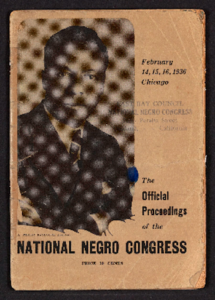
The National Negro Congress program
*The National Negro Congress (NNC) held its first convention on this date in 1936. The NNC was an American organization aiming to fight for Black labor liberation.
Historically, many black workers were segregated and racially discriminated in the labor force. To combat racism within their respective jobs, they had to establish a union. However, most of the unions around the Depression era had exclusively white members, excluding blacks. Black workers took the initiative to unite against racism and classism. During the Great Depression, the Communist Party worked in the United States to unite black and white workers and intellectuals in the fight for racial justice. This period was the Party's peak of prestige in black communities.
The election of Franklin D. Roosevelt resulted in substantial economic, political, and social reform. With the implementation of the New Deal, many African Americans in the North believed they had elected a new leader whose ideas seemed radical. However, most of these programs had no say or input from the black community. John P. Davis attended President Franklin Delano Roosevelt's first National Recovery Administration hearing and noticed that no one represented the interests of blacks. He contacted his friend Robert C. Weaver and formed the two-person Joint Committee on National Recovery in 1933, challenging Roosevelt's New Deal programs.
They traveled the back roads of the deep and dangerous - for a black man - South investigating lynching, voter suppression of Blacks, and the neglected working conditions of black agricultural, textile, and factory workers. Their foundation was a response to the historical oppression blacks faced in the American workforce. Davis and James W. Ford decided to bring together meaningful organizations dedicated to the ongoing fight against racial discrimination; it was the successor to the League of Struggles for Negro Rights. The National Negro Congress advocated for black liberation through the many sectors of African American life.
The NNC launched a broad and multifaceted assault on racism and economic exploitation. Forging alliances with organized labor and even mainstream civil rights groups, the NNC not only drew on the talents and resources of a cross-section of organizations but also established a blueprint, Gellman contends, for the subsequent generations of black activists. Howard University formed NNC; it opposed war, fascism, and racial discrimination. Because of the extensive disenfranchisement of African Americans in the South, the influential Southern Block in Congress represented only their white constituents.
The black community from different sectors began to form their institution to address issues that pertained to the black experience. The National Negro Congress consisted mainly of blacks, but not exclusively. There developed a division between those who supported communism, including its fight on behalf of blacks, and those who only supported civil rights. With the loss of support from the CIO and AFL, Blacks were excluded from major unions. Despite not having the support of the AFL or the CIO, they relied upon the militancy and communist-led organization of the NNC. Participants included intellectuals, civic and civil rights leaders, labor leaders, and religious groups.
White participation was not excluded. Black workers affiliated with the National Negro Congress advocated for integration into the more prominent and better-funded unions such as the CIO. Although the CIO supported the foundation of the National Negro Congress to fight for civil rights and against racism, the communist aspect of the Congress deprived both organizations of having strong ties to each other. The National Negro Congress dispersed in 1946.